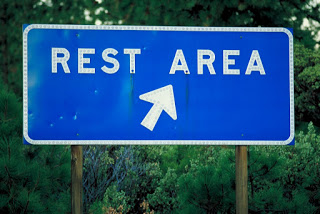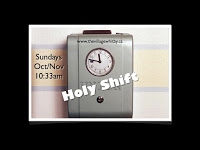Almost every tool we use needs some kind of rest. We shut them off, we recharge them, we reboot them. The need is real when you wake up in the morning and realize that you didn’t recharge your phone – it’s not a pretty sight is it. The funny thing is that we are quick to recharge batteries and phones and computers, but we don’t always shut ourselves off. Some recent surveys suggest that there is more self-imposed overtime these days than ever before. We are busy and we don’t care, because if we’re honest, it makes us feel better about ourselves. Busy is our standard answer to the common question, ‘How are you doing these days?’. However, as Eugene Peterson says, “Business is maybe the most vocation-destroying condition that there is.” How do we find a balance between working hard and resting well? How can we appreciate the work we are called to do while not neglecting our bodies and our minds?
Seems like God had a great idea when he created Sabbath. When we started this series we said that God was our first and best example of work. Interestingly, God is also our first and best example of rest. In the beginning…there was REST. Genesis 2:2-3 says that God, after working for six days, blessed the seventh day and made it holy. God called all the other days good, but this day of rest he called holy. God stops. God creates a finish line. God punches out and says, I’m done, for now. He didn’t do it for himself, because he was tired, he did it for us, to show us that stopping is just a important as working. In other places like Exodus 16 and 20 and 31 we are reminded how important this was to God and to his people, Israel.
Shabat means to stop, to cease, to desist. God’s invitation to participate in Sabbath was an invitation to stop what we are doing, stop working, stop producing, and to be reminded of the things that are important, mainly, Him, his covenant, and the people he’s placed in our lives to do life with (family, friends, community). This became for Israel both a practical way to live, while also being their philosophical identity – who they were in comparison to other nations. In Deuteronomy 5 we see that Sabbath was also a reminder that Israel were no longer living like slaves in Egypt. Sabbath was a weekly reminder that they didn’t have to go at it 24/7 any more; no one was forcing them to work all day, every day. God’s people would be different, they could stop producing and begin trusting…in God.
As much as Sabbath was intended for people, God also intended it for land and agriculture. You can read about this in Leviticus 25 & Deuteronomy 15. Israel is told to work the land for six years and let it rest on the seventh. Not only would they trust God to have enough, they’re also encouraged to give to those in need from their abundance. Sabbath had much to do with justice and generosity as it did with replenishing vessels, either human or earthly.
When we jump to the New Testament we find Jesus pushing back from religious leaders who want to force him to be strict about the Sabbath. Jesus, being a good Jew and Rabbi of course observed the Sabbath, but he wanted his followers to know that the Sabbath was there to serve them/us, not the other way around. What would be the use of being enslaved to a law that is meant to remind people that they don’t have to live in slavery any longer. In light of that, we can feel good about discovering some kind of Sabbath in our lives, without the religiosity or legalistic approach that some faith people attach to it.
So…in 2015, how can we appreciate and invite a principle that was instilled and created so many centuries ago? Great question. First know this, Sabbath is about people stopping long enough to be reminded about what is important to them in life. Those things should be Jesus, family, friends, community, etc. A few things to think about…
Sabbath is about Rhythm
Having a healthy rhythm to your life is so important. God’s idea of Sabbath leads us down that path. Feeling good about working hard while taking the right time to stop is the best way to live in balance. What kind of things add to our healthy Rhythm? Prayer, Scripture, Gathering in Community, Loving your neighbour, Working Hard, Playing Hard, Enjoying Family & Friends.
Sabbath is about Trusting God
By putting a stop to production we are reminded of something that is so important: We are not God. God provides for us. Sure we work hard and earn a pay check, but God is the one behind it all. Working without resting messes with our heads and gets us thinking that the world revolves around us. It doesn’t. It revolves around God. Rest/Sabbath actually makes God bigger in our eyes. Abraham Heschel writes, “The world has our hands for six days, but our souls belong to someone els”.
Sabbath is a Gift
Sabbath isn’t a reward for finishing on time or doing a good job; it’s an intermission in the middle of an ongoing game. Sabbath is like a boss who shows up with coffee and says, “Break Time”. Time is not a possession we own but a gift we are given to use and steward. It’s like money, it’s not ours to hoard, but ours to use wisely.
Sabbath is an Investment
Unlike sleep that forces itself on us, Sabbath has to be invited and welcomed. It’s not about a day it’s about an attitude. Start small: Pray a few minutes a day, not for stuff or requests, but simply to enjoy God and be thankful for what you have – Sit down for dinner without any distractions and simply enjoy your family – Enjoy the church community you’re a part of; when you gather, connect deeply – Find leisure activities that fill you up. Sabbath isn’t just about church, it’s about life; it’s an investment into your faith, your family, your community, yourself.
Before closing this post, pause to read these few texts. Breathe in and breath out and rest in God.
Be Still and Know that I am God (Psalm 46)
My soul finds rest in You (Psalm 62)
Come to me, you who are tired, and I will give you rest (Matthew 11:28)
– – – – – – – – – – – – – – – – – – – – – – – – – – – – –
small(er) group discussion
What resonated with you in this post/talk? What was difficult for you to digest?
Do you see Sabbath as an important principal that is too hard to follow or an old law that is outdated and unpractical?
Why do you think God called the 7th day holy? What’s holy about about rest? What’s holy about reflection? (Genesis 2:2-3)
Deuteronomy 5:15 says “Remember that you were slaves in Egypt and that you were brought out of there with a mighty hand and an outstretched arm. Therefore the Lord your God has commanded you to observe the Sabbath day.” Do you ever feel like you’re a prisoner of your job? What does this say about deliverance and being enslaved to your job or work?
What advice would you offer your small group as helpful ways to instil ‘sabbath’ moments into your life? How does one see Sabbath as Jesus did, a gift to serve us, not a law to be rigorous about?
What would you say about these two quotes on busyness?
“Busyness is maybe the most vocation-destroying thing there is”
“Busyness makes us stop caring about the things we care about.”
Some kind of Sabbath in our lives is healthy if we see it as a way to instil…
Healthy Rhythm/Balance
Trust in God
Seeing time as a Gift
Ways to invest in Faith, Family & Community



